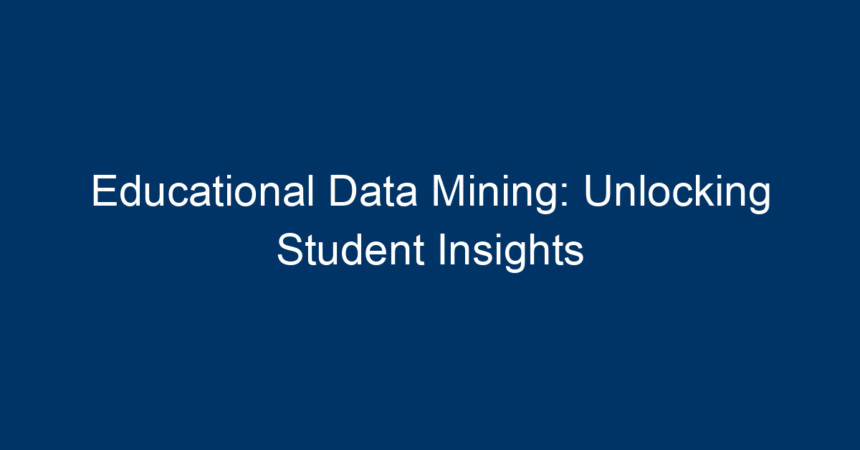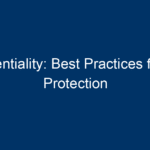In an era where data drives decisions across various sectors, the realm of education is no different. Educational data mining (EDM) is rapidly transforming how educators, administrators, and researchers understand student behavior, learning patterns, and academic performance. By leveraging data, institutions aim to enhance learning experiences, improve student retention, and optimize educational outcomes. In this article, we delve into the concept of educational data mining, its applications, techniques, and the profound insights it can provide into student learning.
Understanding Educational Data Mining
What is Educational Data Mining?
Educational data mining refers to the process of analyzing data generated in educational settings. This data can include a vast array of information, such as student demographics, academic performance, interaction logs in online learning environments, and even social media activity. The primary goal of EDM is to uncover patterns and correlations that can inform educational practices and policies, ultimately enhancing the quality of education.
The Importance of EDM
As educational institutions face increasing pressure to improve student outcomes and streamline operations, EDM has emerged as a pivotal tool. By harnessing data-driven insights, educators can tailor their strategies to better meet the unique needs of their students. Here are some of the critical reasons why educational data mining is essential:
- Personalized Learning: EDM enables the customization of learning experiences based on individual student needs.
- Predictive Analytics: By analyzing historical data, institutions can predict future student performance and dropout rates.
- Resource Optimization: Educational data mining helps in efficiently allocating resources, improving both student and institutional performance.
Techniques in Educational Data Mining
Data Collection Methods
Successful educational data mining begins with robust data collection methods. Schools and universities typically gather data through:
- Learning Management Systems (LMS): Platforms like Moodle or Blackboard provide data on student interactions, assignment submissions, and course completions.
- Surveys and Feedback Forms: Collecting qualitative data through surveys can provide insights into student satisfaction and areas needing improvement.
- Assessment Scores: Standardized test scores, quizzes, and assignments give quantitative measures of student performance.
Data Mining Techniques
Once sufficient data is collected, various mining techniques can be employed:
-
Clustering
- Clustering involves grouping similar data points. For instance, students can be clustered based on their learning behaviors, helping educators identify common challenges or strengths.
-
Regression Analysis
- This technique predicts outcomes based on historical data. For instance, regression models can determine how different factors, such as class attendance, correlate with final grades.
-
Classification
- Classification categorizes data points into distinct groups. For instance, students can be classified as at-risk or high-performing based on predefined criteria, enabling targeted interventions.
- Association Rule Mining
- This technique helps uncover relationships between variables. For example, it can identify which online resources are most often utilized by high-performing students, guiding future resource allocation.
Applications of Educational Data Mining
Enhancing Student Engagement
One of the most profound impacts of educational data mining is its ability to boost student engagement. By analyzing interaction data, teachers can pinpoint which course elements resonate with students. This, in turn, allows educators to refine content delivery methods and foster a more engaging learning environment.
Early Warning Systems
EDM plays a crucial role in developing early warning systems for at-risk students. By tracking performance metrics in real-time, institutions can identify students who may need additional support long before they fail. Interventions can then be implemented, such as tutoring or counseling, to help these students succeed.
Curriculum Improvement
Through continuous analysis of student data, institutions can identify which curricula are most effective. For instance, if data reveals that students struggle with specific subjects or topics, educators can adjust their teaching strategies, thereby enhancing overall curriculum effectiveness.
Faculty Development
Data mining isn’t just for students; it can also enhance faculty development. By analyzing teaching effectiveness based on student performance and feedback, institutions can create professional development programs tailored to faculty needs, fostering a culture of continuous improvement.
Ethical Considerations in Educational Data Mining
As we dive deeper into educational data mining, it is essential to address ethical considerations. The use of student data raises several concerns:
-
Privacy: Protecting the personal information of students is paramount. Institutions must ensure compliance with regulations like FERPA (Family Educational Rights and Privacy Act) to safeguard student data.
-
Bias and Discrimination: Care must be taken to ensure that data interpretations do not lead to unfair biases. For instance, if certain student demographics are consistently flagged as at-risk based on flawed data, they may unduly suffer from negative stereotypes.
- Transparency: Educators and institutions must maintain transparency about how student data is used and the insights derived from it. This builds trust among students and parents.
Future Trends in Educational Data Mining
Integration of AI and Machine Learning
The future of educational data mining is inextricably linked to advancements in artificial intelligence (AI) and machine learning (ML). These technologies can enhance the speed and accuracy of data analysis, making it possible to derive insights in real time.
Gamification of Learning Through Data
Gamification — integrating game-like elements into learning — can be further enhanced through educational data mining. By analyzing data on student interactions, educators can design gamified experiences that maximize engagement and knowledge retention.
Collaborative Learning Insights
With the rise of hybrid and online learning environments, EDM can provide valuable insights into collaborative learning. By analyzing group work data, educators can understand how peer interactions affect learning outcomes and tailor group activities to foster collaboration effectively.
Actionable Insights for Educators and Administrators
-
Invest in Data Collection Technologies: Implement robust systems that can gather diverse data types to enrich the data pool available for analysis.
-
Train Staff on Data Literacy: Ensure that faculty and staff understand data interpretation and insights. This building of data literacy will empower them to make informed decisions.
-
Use Data to Personalize Learning: Leverage insights from EDM to create tailored learning experiences that cater to individual student needs.
-
Establish Ethical Guidelines: Create clear policies that address privacy, bias, and transparency in data use to maintain trust among stakeholders.
- Stay Updated with Technological Advances: Keep an eye on emerging technologies like AI and ML that can further enhance EDM capabilities and insights.
Conclusion
Educational data mining is not just a buzzword; it’s a transformative approach that holds the potential to reshape the educational landscape. By unlocking insights from student data, institutions can personalize learning, predict challenges, and ultimately boost academic success. As we move forward, the integration of advanced technologies and ethical considerations will be paramount to harnessing the full potential of EDM. The time to embrace this data-driven approach is now, paving the way for a brighter future in education.




